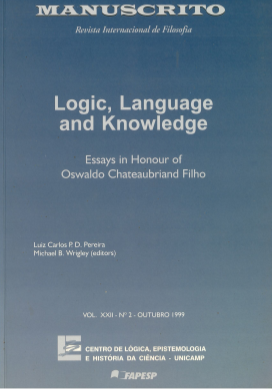Resumo
We examine some issues concerning a logical system for the precise treatment of assertions involving “almost all” objects and analyse its underlying ideas. We concentrate on the usage of ultrafilters for capturing the intended meaning of “almost universal” assertions by analysing its underlying presuppositions and some basic intuitions. We first reasses the ultrafiltre proposal, suggesting na alternative interpretation, and then analyse a few questions, trying to overcome some objections against using ultrafilters.
Referências
Antoniou, G. (1997). Nonmonotonic Reasoning (Cambridge, MA, MIT Press).
Barwise, J. (ed.) (1977). Handbook of Mathematical Logic (Amsterdam, North-Holland).
Bell, J.L. & Slomson, A.B. (1971). Models and Ultraproducts: an introduction North-Holland, Amsterdam, 1971 (2nd rev. pr.).
Brewka, G. (1991). Nonmonotonic Reasoning: logical foundations of commonsense (Cambridge, Cambridge University Press).
Carnielli, W.A. & Sette, A.M. (1994). Default operators (Abstr.). Workshop on Logic. Language, Information and Camputation, Recife, Brazil.
Carnielli, W.A. & Veloso, P.A.S. (1997). Ultrafilter logic and generic reasoning. In Gottlob, G., Leitsch, A. & Mundici, D. (eds.) Computational Logic and Proof Theory (5th Kurt Gödel Colloquium: KGC’97) (34-53) (Berlim, Springer-Verlag).
Chang, C.C. & Keisler, H.J. (1973). Model Theory (Amsterdam, North-Holland).
Church, A. (1956). Introduction to Mathematical Logic: vol. I (Princeton, NJ, Princeton University Press).
Collins, C. (1987). Collins Cobuild English Language Dictionary (London, Collins).
Enderton, H.B. (1972). A Mathematical Introduction to Logic (New York, Academic Press).
Fine, K. (1985). Reasoning with Arbitrary Objects (Oxford, Basil Blackwell), {Aristotelian Soc. Series, vol. 3}.
Frege, G. (1879). Begriffsschrift, eine deer arithmetischen nachgebildete Formelsprache des reines Denken (Halle, Louis Nebert). {English translation in van Heijenoort, J, (ed.) From Frege to Gödel; Cambridge, MA, Cambridge University Press, 1967}.
Gärdenfors, P. (1988). Knowledge in Flux: modelling The dynamics of epistemic states (Cambridge, MA, MIT Press).
Grácio, M.C.G. (1999). Lógicas Moduladas e Raciocínio sob Incerteza. Unicamp, D. Sc. diss., Campinas, Oct. 1999.
Halmos, P.R. (1972). Lectures on Boolean Algebras (London, Van Nostrand Reinhold, (repr.)).
Hempel, C. (1965). Aspects of Scientific Explanation and Other Essays in the Philosophy of Science (New York, Free Press).
Lindström, P. (1966). On extensions of elementar logic, Theoria 35: 1-11.
Lukaszewicz, W. (1990). Non-monotonic Reasoning: formalization of commonsense reasoning (Chichester, Ellis Horwood).
Keisler, H.J. (1970). Logic with the quantifer ‘there exist uncountably many, Annals of Math. Logic 1:1-93.
Makinson, D. & Gärdenfors, P. (1991). Relations between the logic f theory change and non-monotonic logic. In Fuhrmann, A. & Morreau, M. (eds.) The Logic of Theory Change (Berlin, Springer-Verlag).
Marek, V.W. & Truszczynski, M. (1993). Nonmonotonic Logic: contexto-dependent reasoning (Berlin, Springer-Verlag).
Reiter, R. (1980). A logic for default reasoning , J. Artificial Intelligence 13 (1):81-132.
Schlechta, K. (1995). Defauts as generalized quantifiers, J. Logic and Computation 5 (4):473-494.
Sette, A.M., Carnielli, W.A. & Veloso, P.A.S. (1999). Na alternative view of defaut reasoning and its logic. In Haeusler, E.H. & Pereira, L.C. (eds.) Pratica: Proofs, Types and Categories (127-158) (Rio de Janeiro, PUC), May 1999.
Solomon, R. (1999). Ordered groups: a case study in reverse mathematics, Bull of Symbolic Logic 5 (1):45-58, March.
Tarski, A. (1936). Logic, Semantics and Metamathematics: papers from 1923 to 1938 [woodger, J.H. (transl.)] (Oxford, Clarendon Press).
Turner, W. (1984). Logics for Artificial Intelligence (Chilchester, Ellis Horwood).
Veloso, P.A.S. & Carnielli, W.A. (1997). An ultrafiltre logic for generic reasoning and some applications, Res. Rept. ES-ES-437/97, COPPE-URFJ, Rio de Janeiro, April 1997.
Veloso, P.A.S. (1998). On ultrafiltre logic as a logic for ‘almost all’ and ‘generic’ reasoning, Res. Rept. ES-488/98, COPPE-URFJ, Rio de Janeiro, December 1998.
Veloso, P.A.S (1999). On ultrafiltre logic and a missing axiom, Bull. of Sect. Logic 28 (1): 17-26, March, 1999.
Webster, N. (1970). Webster’s Seventh New Collegiate Dictionary (Springfield, MA., Merriam Co.).

Este trabalho está licenciado sob uma licença Creative Commons Attribution 4.0 International License.
Copyright (c) 1999 Manuscrito: Revista Internacional de Filosofia

